Margarete Schlegel (1899–1987) was a German theatre and film actress and soprano operetta singer active in Germany between 1919-1933. Himmler proposed her to continue her film career under the Third Reich if she divorced her assimilated Jewish husband. She continued her career at the British radio till 1955.
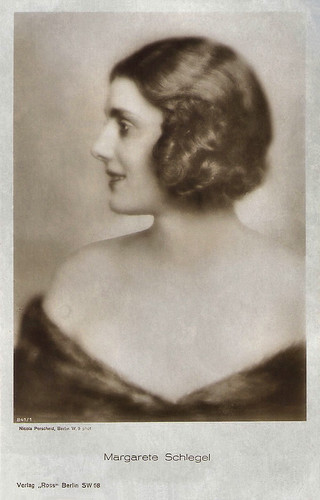
German postcard by Ross Verlag, no. 841/1, 1925-1926. Photo: Nicola Perscheid, Berlin
Margaret Schlegel was born 31 December 1899 in Bromberg, West Prussia, Germany, (now Bydgoszcz, Poland) to a German-speaking Prussian-Polish Catholic family. Her father was Augustin Heinrich Schlegel, who legally changed the family surname from Wisniewski to Schlegel upon relocating them to Berlin in 1904, while her mother was Anna Agatha Schlegel née Garski.
Naturally beautiful and talented (she could sing, dance and act very well from an early age), Margarete Schlegel sought a chorus role in theatre in 1917 as a way of earning extra money for her family while still a schoolgirl due to the hardship of the First World War.
This soon led to a starring role in the farce Charley’s Aunt at the Thalia Theatre and later both serious and comic roles at the Deutsches Theater in Berlin, where Margarete was trained and mentored by theatre director Max Reinhardt.
After the war, from 1919, she was frequently cast in the Weimar cinema, beginning with a small part in Paul Leni’s Prinz Kuckuck/Prince Cuckoo (1919), starring Conrad Veidt.
Already in her second film she had a female lead opposite Dutch actor Ern(e)st Winar in the Herman Bang adaptation Die Benefiz-Vorstellung der Vier Teufel/The Four Devils (A.W. Sandberg, 1920). Bang’s book already had been adapted for film by Alfred Lind in 1911 and would be used again by F.W. Murnau for his Four Devils (1928).
Next, she had the female lead in Der Januskopf/The Head of Janus (F.W. Murnau, 1920), a now lost Murnau film, starring Conrad Veidt and based on Robert Louis Stevenson’s The Strange Case of Dr. Jekyll and Mr. Hyde. She also had a major lead in his Sehnsucht/Desire (F.W. Murnau, 1920), another lost film, alas, about a Russian dancer (again Veidt), messed up in an intrigue between aristocracy and revolutionaries, which causes his beloved (Schlegel) to be sent to Siberia.
In 1921 followed films like Der ewige Fluch/The Eternal Curse (Fritz Wendhausen 1921), set in the Netherlands, Die Intriguen der Madame de la Pommeraye/Madame de La Pommeraye's Intrigues (Fritz Wendhausen, 1921), and Betrüger des Volkes/The Cheater of the People (Carl Heinz Boese, Reinhold Schünzel, 1921).
After various bit parts in the early 1920s, Schlegel had female leads again in the mountain film Die sterbende Stadt/The Dying City (Holger-Madsen 1921), produced by Arnold Fanck, and Liebe, Tor und Teufel/Love, Fool and Devil (Adolf Wenter, 1922) with Charles Willy Kayser – an actor with whom Schlegel often acted with.
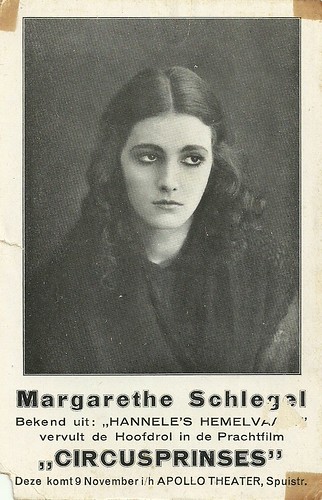
Dutch postcard. Publicity card for the showing of the film Die Magyarenfürstin (Werner Funck, 1923) at the The Hague Apollo Theater at Spuistraat. Schlegel is announced as the actress famous for Hannele's Himmelfahrt. The Dutch title for the film was The Circus Princess.
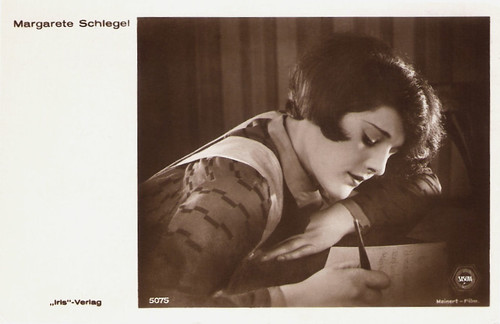
Austrian postcard by Iris Verlag, no. 5075. Photo: Sascha Film / Meinert-Film.
After a supporting part in Sodoms Ende/Sodom's End (Felix Basch, 1922), Margarete Schlegel had one of her biggest roles in the religious film Hannele’s Himmelfahrt/Hannele's Ascension (Urban Gad, 1923), adapted from Gerhard Hauptmann’s book. Schlegel plays the title role as the stepchild of a rude man (Hermann Vallentin) who mistreats and abuses the girl, leading to her suicide after she has had a vision that heaven is better than life on earth.
The film altered some scenes in the beginning but kept the general plot and the mood from the second part of Hauptmann’s tale. The film had a grand premiere at the Berliner Staatsoper in 1922, and was well received. Walter Rilla as the angel of death had its debut in this film.
Schlegel played again with director A.W. Sandberg in his Danish Dickens adaptation David Copperfield (1922), acting as David's mother. She had another lead in Die Magyarenfürstin/The Magyar Princess (Werner Funck 1923), though it was not such a success as the previous film.
Again opposite Vallentin, Schlegel played the female lead in Das Geheimnis des Renngrafen/The Secret of the Rally Driver (A. Bergson, 1923), while she was Ernst Deutsch’s sweetheart in Das alte Gesetz/This Ancient Law (E.A. Dupont 1923), about a rabbi’s son (Deutsch), who becomes a stage actor and thanks to an Austrian archcountess (Henny Porten) is promoted to the highest ranks in the theatre world, but in the end reconciles with his father and returns to his village and his beloved. The film still exists.
After contributing to the educational film Wunder der Schöpfung/In the World of the Stars (1925) Schlegel acted opposite Charles Willy Kayser, Maria Minzenti, John Stuart and others in Die Frauen zweier Junggesellen (Franz Seitz sen., 1925), and opposite Ernst Reicher in his Stuart Webbs detective Der Schuss im Pavillion (Max Obal 1925).
After a few more films, Schlegel had again the lead in Zwei unterm Himmelszelt (Johannes Guter, 1927), adapted from a novel by Ludwig Wolff. She played a banker’s daughter opposite Ernst Deutsch as a taxi dancer, and Jean Angelo.
More films followed in the later 1920s, a.o. Die Zigeunerprimas/The Gypsy Chief (Carl Wilhelm 1929), an adaptation of the Emmerich Kálmán operetta, starring Paul Heidemann, and Der Sittenrichter/The Customs Judge (Carl Heinz Wolff, 1929), in which Schlegel had the lead.
During the 1920s, while working in the cinema, Margarete Schlegel continued to star in theatre roles and operettas, such as Franz Lehár's Merry Widow and Gypsy Love. Her soprano repertoire included arias and lieder by Jacques Offenbach, Giacomo Puccini, George Frideric Handel, Johannes Brahms, Richard Strauss and Johann Strauss, which she performed in recitals and radio broadcasts in addition to the musical numbers she sang in sound feature films.
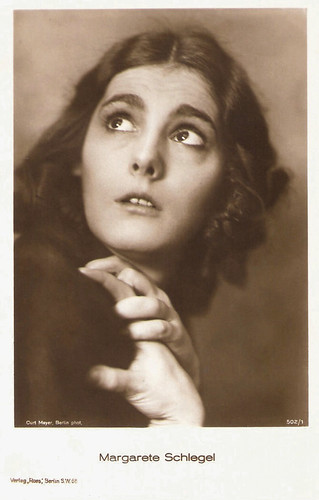
German postcard by Ross Verlag, no. 502/1, 1919-1924. Photo: Curt Mayer, Berlin.
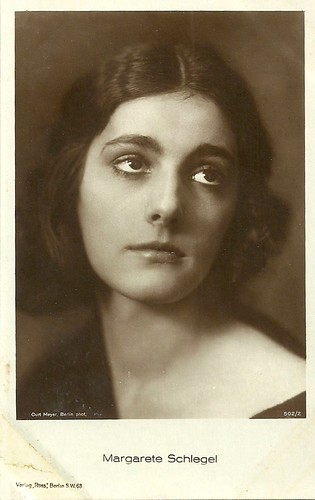
German postcard by Ross Verlag, no. 502/2, 1919-1924. Photo: Curt Mayer, Berlin.
In the early sound era of German cinema (1930-1932), Schlegel did few films anymore, but some very interesting ones.
Billy Wilder wrote the screenplay of her last German film, a romantic operetta comedy called Das Blaue vom Himmel/The Blue from the Sky (Viktor Janson, 1932), starring Márta Eggerth and Hermann Thimig. The film was released in December 1932 just prior to Hitler's ascent to power and therefore not subject to Nazi dictates.
Her best known and penultimate film was Phil Jutzi’s morality play Berlin-Alexanderplatz: Die geschichte Franz Biberkopfs (1931), adapted from Alfred Döblin’s novel (later adapted by R.W. Fassbinder as well).
Here Schlegel played Sonja, later called Mieze, Franz' new girl who is eventually killed by the evil criminal Reinhold (Bernhard Minetti). The film focuses on Heinrich George as the ex-convict Franz Biberkopf who is drawn into the Berlin underworld.
In all, Schlegel appeared in 35 silent films and three sound films of differing styles during the Weimar era. In 1924 Margarete Schlegel had married the assimilated Jewish-Prussian political economist, Prof Hermann Joachim Levy. In 1926 they had a son, Hermann Martin Heinrich Levy, who was baptised Catholic.
When in May 1933 her husband was dismissed from university by the Nazis, and his academic books and novels were burned, he travelled to Britain as visiting professor in Cambridge. Margarete Schlegel declined offers from friends in Hollywood.
In 1935 she was offered the chance by Heinrich Himmler to continue her film career under the Third Reich on the condition that as an Aryan she divorced her assimilated Jewish husband, but instead she fled with her son to join her husband in Britain. By consequence, in 1938 the Nazis officially proscribed her films, her husband was added to Hitler's death list of opponents, and their home was seized by the Nazis.
After arriving in England, Schlegel became a featured soprano on BBC Radio in operas and operettas in the late 1930s. During WW II she broadcast anti-Nazi German-language propaganda radio programs for BBC Europe which were heard across the continent.
After her husband died in 1949 from a heart attack, she remarried and moved to Saltdean on the Sussex coast in England. In the 1950s she continued broadcasting for BBC Radio, singing in operettas. She also sang and spoke in German language educational radio programs for the BBC from 1938 onwards.
Margarete Schlegel died in 1987.
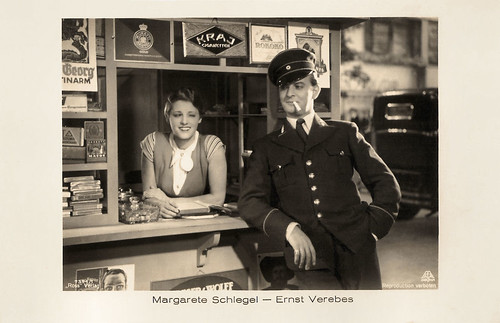
German postcard by Ross Verlag, no. 7394/1, 1932-1933. Photo: Aafa Film. Publicity still for Das blaue vom Himmel/The Blue from the Sky (Victor Janson, 1932) with Ernst Verebes.
Sources: Filmportal.de, Wikipedia (German and English), and IMDb.

German postcard by Ross Verlag, no. 841/1, 1925-1926. Photo: Nicola Perscheid, Berlin
Naturally beautiful and talented
Margaret Schlegel was born 31 December 1899 in Bromberg, West Prussia, Germany, (now Bydgoszcz, Poland) to a German-speaking Prussian-Polish Catholic family. Her father was Augustin Heinrich Schlegel, who legally changed the family surname from Wisniewski to Schlegel upon relocating them to Berlin in 1904, while her mother was Anna Agatha Schlegel née Garski.
Naturally beautiful and talented (she could sing, dance and act very well from an early age), Margarete Schlegel sought a chorus role in theatre in 1917 as a way of earning extra money for her family while still a schoolgirl due to the hardship of the First World War.
This soon led to a starring role in the farce Charley’s Aunt at the Thalia Theatre and later both serious and comic roles at the Deutsches Theater in Berlin, where Margarete was trained and mentored by theatre director Max Reinhardt.
After the war, from 1919, she was frequently cast in the Weimar cinema, beginning with a small part in Paul Leni’s Prinz Kuckuck/Prince Cuckoo (1919), starring Conrad Veidt.
Already in her second film she had a female lead opposite Dutch actor Ern(e)st Winar in the Herman Bang adaptation Die Benefiz-Vorstellung der Vier Teufel/The Four Devils (A.W. Sandberg, 1920). Bang’s book already had been adapted for film by Alfred Lind in 1911 and would be used again by F.W. Murnau for his Four Devils (1928).
Next, she had the female lead in Der Januskopf/The Head of Janus (F.W. Murnau, 1920), a now lost Murnau film, starring Conrad Veidt and based on Robert Louis Stevenson’s The Strange Case of Dr. Jekyll and Mr. Hyde. She also had a major lead in his Sehnsucht/Desire (F.W. Murnau, 1920), another lost film, alas, about a Russian dancer (again Veidt), messed up in an intrigue between aristocracy and revolutionaries, which causes his beloved (Schlegel) to be sent to Siberia.
In 1921 followed films like Der ewige Fluch/The Eternal Curse (Fritz Wendhausen 1921), set in the Netherlands, Die Intriguen der Madame de la Pommeraye/Madame de La Pommeraye's Intrigues (Fritz Wendhausen, 1921), and Betrüger des Volkes/The Cheater of the People (Carl Heinz Boese, Reinhold Schünzel, 1921).
After various bit parts in the early 1920s, Schlegel had female leads again in the mountain film Die sterbende Stadt/The Dying City (Holger-Madsen 1921), produced by Arnold Fanck, and Liebe, Tor und Teufel/Love, Fool and Devil (Adolf Wenter, 1922) with Charles Willy Kayser – an actor with whom Schlegel often acted with.

Dutch postcard. Publicity card for the showing of the film Die Magyarenfürstin (Werner Funck, 1923) at the The Hague Apollo Theater at Spuistraat. Schlegel is announced as the actress famous for Hannele's Himmelfahrt. The Dutch title for the film was The Circus Princess.

Austrian postcard by Iris Verlag, no. 5075. Photo: Sascha Film / Meinert-Film.
Mistreated and abused
After a supporting part in Sodoms Ende/Sodom's End (Felix Basch, 1922), Margarete Schlegel had one of her biggest roles in the religious film Hannele’s Himmelfahrt/Hannele's Ascension (Urban Gad, 1923), adapted from Gerhard Hauptmann’s book. Schlegel plays the title role as the stepchild of a rude man (Hermann Vallentin) who mistreats and abuses the girl, leading to her suicide after she has had a vision that heaven is better than life on earth.
The film altered some scenes in the beginning but kept the general plot and the mood from the second part of Hauptmann’s tale. The film had a grand premiere at the Berliner Staatsoper in 1922, and was well received. Walter Rilla as the angel of death had its debut in this film.
Schlegel played again with director A.W. Sandberg in his Danish Dickens adaptation David Copperfield (1922), acting as David's mother. She had another lead in Die Magyarenfürstin/The Magyar Princess (Werner Funck 1923), though it was not such a success as the previous film.
Again opposite Vallentin, Schlegel played the female lead in Das Geheimnis des Renngrafen/The Secret of the Rally Driver (A. Bergson, 1923), while she was Ernst Deutsch’s sweetheart in Das alte Gesetz/This Ancient Law (E.A. Dupont 1923), about a rabbi’s son (Deutsch), who becomes a stage actor and thanks to an Austrian archcountess (Henny Porten) is promoted to the highest ranks in the theatre world, but in the end reconciles with his father and returns to his village and his beloved. The film still exists.
After contributing to the educational film Wunder der Schöpfung/In the World of the Stars (1925) Schlegel acted opposite Charles Willy Kayser, Maria Minzenti, John Stuart and others in Die Frauen zweier Junggesellen (Franz Seitz sen., 1925), and opposite Ernst Reicher in his Stuart Webbs detective Der Schuss im Pavillion (Max Obal 1925).
After a few more films, Schlegel had again the lead in Zwei unterm Himmelszelt (Johannes Guter, 1927), adapted from a novel by Ludwig Wolff. She played a banker’s daughter opposite Ernst Deutsch as a taxi dancer, and Jean Angelo.
More films followed in the later 1920s, a.o. Die Zigeunerprimas/The Gypsy Chief (Carl Wilhelm 1929), an adaptation of the Emmerich Kálmán operetta, starring Paul Heidemann, and Der Sittenrichter/The Customs Judge (Carl Heinz Wolff, 1929), in which Schlegel had the lead.
During the 1920s, while working in the cinema, Margarete Schlegel continued to star in theatre roles and operettas, such as Franz Lehár's Merry Widow and Gypsy Love. Her soprano repertoire included arias and lieder by Jacques Offenbach, Giacomo Puccini, George Frideric Handel, Johannes Brahms, Richard Strauss and Johann Strauss, which she performed in recitals and radio broadcasts in addition to the musical numbers she sang in sound feature films.

German postcard by Ross Verlag, no. 502/1, 1919-1924. Photo: Curt Mayer, Berlin.

German postcard by Ross Verlag, no. 502/2, 1919-1924. Photo: Curt Mayer, Berlin.
Anti-Nazi German-language propaganda
In the early sound era of German cinema (1930-1932), Schlegel did few films anymore, but some very interesting ones.
Billy Wilder wrote the screenplay of her last German film, a romantic operetta comedy called Das Blaue vom Himmel/The Blue from the Sky (Viktor Janson, 1932), starring Márta Eggerth and Hermann Thimig. The film was released in December 1932 just prior to Hitler's ascent to power and therefore not subject to Nazi dictates.
Her best known and penultimate film was Phil Jutzi’s morality play Berlin-Alexanderplatz: Die geschichte Franz Biberkopfs (1931), adapted from Alfred Döblin’s novel (later adapted by R.W. Fassbinder as well).
Here Schlegel played Sonja, later called Mieze, Franz' new girl who is eventually killed by the evil criminal Reinhold (Bernhard Minetti). The film focuses on Heinrich George as the ex-convict Franz Biberkopf who is drawn into the Berlin underworld.
In all, Schlegel appeared in 35 silent films and three sound films of differing styles during the Weimar era. In 1924 Margarete Schlegel had married the assimilated Jewish-Prussian political economist, Prof Hermann Joachim Levy. In 1926 they had a son, Hermann Martin Heinrich Levy, who was baptised Catholic.
When in May 1933 her husband was dismissed from university by the Nazis, and his academic books and novels were burned, he travelled to Britain as visiting professor in Cambridge. Margarete Schlegel declined offers from friends in Hollywood.
In 1935 she was offered the chance by Heinrich Himmler to continue her film career under the Third Reich on the condition that as an Aryan she divorced her assimilated Jewish husband, but instead she fled with her son to join her husband in Britain. By consequence, in 1938 the Nazis officially proscribed her films, her husband was added to Hitler's death list of opponents, and their home was seized by the Nazis.
After arriving in England, Schlegel became a featured soprano on BBC Radio in operas and operettas in the late 1930s. During WW II she broadcast anti-Nazi German-language propaganda radio programs for BBC Europe which were heard across the continent.
After her husband died in 1949 from a heart attack, she remarried and moved to Saltdean on the Sussex coast in England. In the 1950s she continued broadcasting for BBC Radio, singing in operettas. She also sang and spoke in German language educational radio programs for the BBC from 1938 onwards.
Margarete Schlegel died in 1987.

German postcard by Ross Verlag, no. 7394/1, 1932-1933. Photo: Aafa Film. Publicity still for Das blaue vom Himmel/The Blue from the Sky (Victor Janson, 1932) with Ernst Verebes.
Sources: Filmportal.de, Wikipedia (German and English), and IMDb.
No comments:
Post a Comment